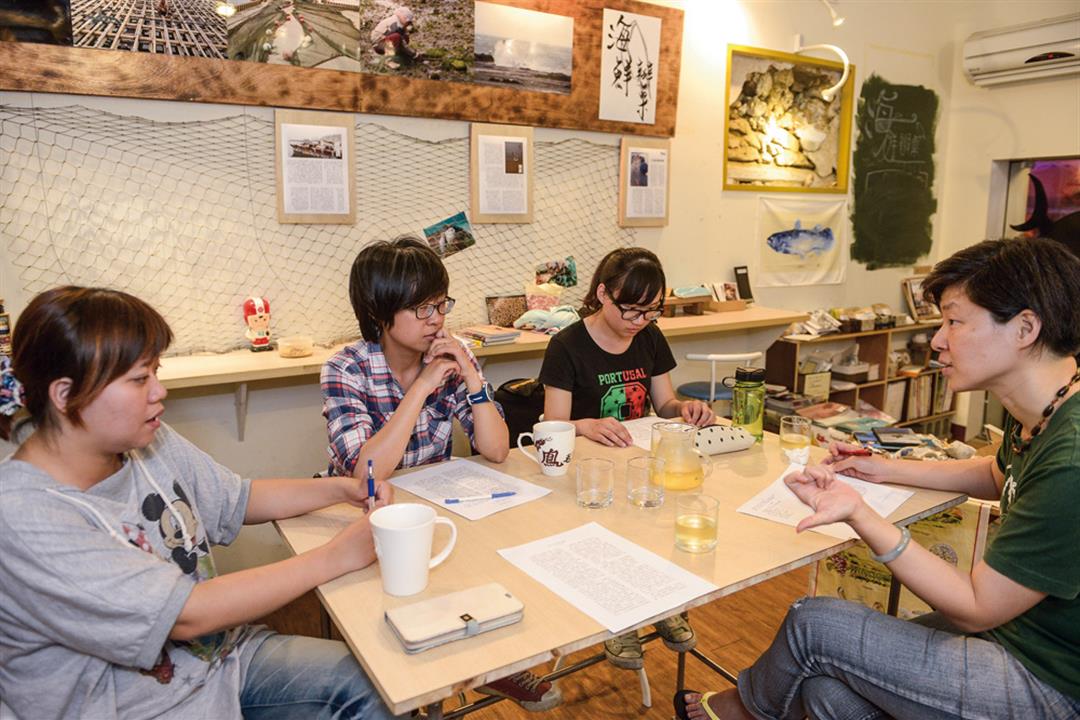A feeling for the old-fashioned
Zhu Yunwei is a 49-year-old native of Yingge, New Taipei City, where he still has his home. During his studies at National Pingtung Institute of Agriculture, Zhu was a member of the school’s birdwatching club, which was the start of a lifelong love of all things avian. Later, as a graduate student at National Sun Yat-Sen University, he began studying ocean fish, his first step into the marine world. After that, he entered National Taiwan University to pursue a PhD and began to undertake marine surveys on commission. He also founded a marine technology company in Kaohsiung, taking on more ecological monitoring cases and teaching courses at a few different colleges.
It was while teaching at Chang Jung Christian University that he met Deng Peizhen. A biotechnology graduate, the now-29-year-old Deng found herself fascinated by Zhu’s General Ecological Education program, studying in the program for the full four years of her undergraduate studies.
Originally from Hsinchu, Deng was hired by Zhu in her senior year to work part time at his marine technology firm, often heading to Penghu with her colleagues to do monitoring and collect samples. Along the way, her knowledge and her interest both grew, and after graduating she joined the company full time as a surveyor.
Four years ago, to facilitate their operations, Zhu arranged for Deng to be stationed in Penghu, planning to lease an office in Magong to more easily secure a government project they were tendering for. At first Zhu was very optimistic, signing a five-year contract for a space costing NT$3,000 a month in rent.
But when the results of the tendering process were announced the next year, Zhu and company found themselves out of luck. While that in itself was no concern for Zhu, he couldn’t leave the space they’d rented idle, so he decided to convert it into an environmentally themed exhibition space, naming it Juv. Art Center and making Deng the manager.
The process of setting up Juv. Art Center also helped Zhu understand the Penghu frame of mind. Every three months he would come to Penghu for surveys, and over the course of more than a decade he began to really develop an attachment to the islands, sparked by nothing more than an old doorway.
Back in 2010, as he was riding from Magong Airport into the city, Zhu’s eyes were drawn to the old buildings that lined the road. One pair of old wooden doors especially caught his eye; they were engraved with a four-character Chinese phrase, “guang tian hua ri,” meaning “the clear light of day,” and alluding to a period of incorrupt good governance.
Not only were the characters carved rather than being pasted up as a paper couplet, the choice of words was also intriguing, refreshingly unlike more clichéd choices such as “guo tai min an” (“peace and prosperity”). Grabbing his camera, he took a few photos and then went along his way. From then on, though, he began using his survey visits as opportunities to explore the islands for more doorways like that.
As he traveled around the islands of Penghu, he captured images of hundreds of such doors, accumulating over 3,000 images containing similarly classical, yet uncommon, choices of inscription.
In July 2012, Juv. Art Center opened its doors, with Zhu having arranged for the first exhibition to be one of photos of those old doorways, in the hopes of helping Penghu locals appreciate the spectacular place in which they live, while also helping build a relationship with those same locals.
That exhibition may have been the start of Juv. Art Center’s life, but what really sparked the center’s popularity was a series of talks it hosted on popular science and the environment.

Iland Books was Penghu’s first independent bookstore, and is run by Chen Aiwen, from Keelung. Independent doesn’t need to mean alone, as the friendly and supportive relationship between Iland and Juv. Art Center demonstrates.